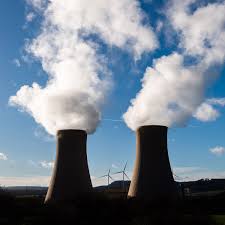 As Africa’s interest in nuclear energy grows, two global powers, the United States and Russia, are actively vying for influence in the continent’s nascent nuclear energy market. With several African nations aiming to harness nuclear power by 2030, these countries are offering tailored solutions, knowledge transfer, and educational partnerships to support Africa’s nuclear ambitions.
As Africa’s interest in nuclear energy grows, two global powers, the United States and Russia, are actively vying for influence in the continent’s nascent nuclear energy market. With several African nations aiming to harness nuclear power by 2030, these countries are offering tailored solutions, knowledge transfer, and educational partnerships to support Africa’s nuclear ambitions.
Currently, South Africa is the only African nation with an operational nuclear power plant. However, countries like Egypt, Ghana, Kenya, Morocco, Nigeria, Rwanda, Tanzania, and Uganda are exploring nuclear energy as a low-carbon electricity source. These nations are being courted by the US and Russia, both of which are eager to provide insights and support through forums and partnerships.
The United States is actively engaging with African nations through initiatives like the US-Africa Nuclear Energy Summit (USANES). The second edition of this summit will be hosted in Kenya, focusing on the readiness of the African nuclear industry and the future of nuclear energy on the continent. The US aims to highlight its own nuclear industry’s achievements over the past 70 years and demonstrate how African countries can similarly benefit from nuclear power development. The summit will feature discussions on Africa’s industry readiness, nuclear financing, and a special session on a US-Ghana commercial agreement on nuclear power. This agreement follows the Africa Nuclear Business Platform meeting in Accra, Ghana, where the US announced new civil nuclear cooperation to support Ghana’s safe and secure use of nuclear power, including establishing Ghana as a regional hub for small modular reactors (SMRs).
Russia, through its state-owned company Rosatom, is also making significant strides in Africa’s nuclear market. Since 2023, Russia has been signing memoranda of understanding with various African governments, offering localized nuclear solutions. During the Atomexpo 2024 in Russia, Rosatom reiterated its commitment to providing a range of nuclear solutions tailored to Africa’s diverse needs, including large-scale nuclear power plants, Floating Nuclear Power Plants (FNPPs), and SMRs.Rosatom has been actively involved in numerous projects across Africa, focusing on infrastructure development, educational cooperation, and technology transfers. The company has announced plans to build a Russian-designed low-power nuclear power plant in Mali and has expanded peaceful atomic cooperation with countries like Burkina Faso, Burundi, Ethiopia, and Zimbabwe.
Rosatom is currently constructing a $25 billion nuclear power plant in El-Dabaa, Egypt, which will have a total installed nuclear energy capacity of 4.8 gigawatts (GW). Meanwhile, Ghana is emerging as a potential contender for nuclear power, planning to select a vendor for its nuclear plant by the end of 2024.In South Africa, the continent’s only existing nuclear facility, Koeberg, recently received a 20-year life extension for its Unit 1, with hopes for a similar extension for Unit 2 following refurbishment.
As Africa moves towards nuclear energy, the US and Russia are positioning themselves as key partners, offering innovative solutions and strategic partnerships. Their involvement not only highlights the continent’s growing energy needs but also underscores the global interest in Africa’s energy future. Through these collaborations, African nations have the opportunity to develop reliable, low-carbon electricity sources, essential for sustainable economic growth.
Researched by Tunde Ojediran.

